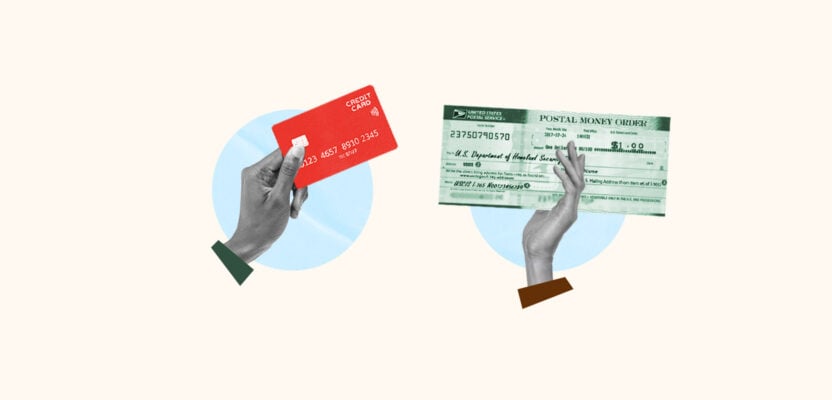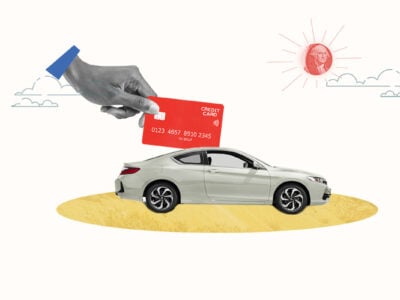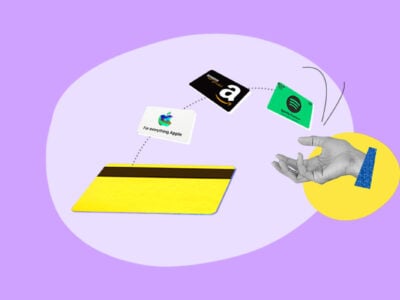Money orders are a lot like checks. The difference is that you fully pay for them upfront, which means that it’s impossible for them to bounce.
Money orders are very convenient, but they’re not as common as they used to be. If you’re not very comfortable with money orders but you’re trying to send money to someone who’s requesting one, you may find yourself wondering whether you can just buy it with your credit card.
Unfortunately, the answer is no, you usually can’t buy a money order with a credit card. It’s perfectly legal to do so, but most money order sellers have policies against it. What’s more, buying a money order with credit comes with serious downsides.
Table of Contents
Why most sellers won’t let you buy a money order with a credit card
As mentioned, money orders are very similar to checks. You can buy them from banks, from the post office, and from several major retail chains, such as 7-11 and Walmart.
The vast majority of these merchants have policies against letting customers pay for money orders with credit cards. They’ll usually only accept cash or your debit card.
There are two reasons why money order merchants prefer not to accept credit card payments:
- Processing fees: Any time you buy something with a credit card, the seller will be charged a fee, generally 1.5%–3.5% of the amount you spent. For obvious reasons, money order merchants prefer to avoid these fees.
- Your own protection: Even when it’s allowed, buying a money order with a credit card is a bad idea. It can harm your finances and your credit, and there’s almost always a better option. Banks and other issuers don’t want to let you make an obvious financial mistake, especially when they themselves won’t even benefit from it.
We’ll fully explain the downsides of buying a money order with a credit card further down in this article.
What merchants allow you to buy a money order with a credit card?
There are currently no major merchants that allow you to buy money orders with a credit card.
Some sites incorrectly state that 7-11, Western Union, and Kmart allow this type of transaction. This was true at one point, but all three of those companies have changed their policies. They now only accept cash and debit card payments for money orders.
It’s theoretically possible that there are lesser-known outlets (e.g., branches of small credit unions) that will still accept credit card payments for money orders. However, if there are, they don’t advertise this online, and it’ll be hard to find them.
Again, because getting a money order with your credit card is almost never a good move, there’s really no reason to worry about this.
Why you shouldn’t buy a money order with a credit card
Even if you are able to find a merchant who will accept credit card payments for a money order (a long shot), doing so comes with three serious downsides:
1. Your card issuer will probably treat it as a cash advance
Most of the time, credit card companies treat buying a money order as a type of credit card cash advance (using your card to borrow money directly instead of making a purchase).
Taking out a cash advance comes with different rules than making an ordinary purchase. In general, cash advances are significantly more expensive than other credit card transactions.
Cash advances often come with:
- Extra fees: Many credit cards feature special cash advance fees (often at least 5% of the transaction). Unless your money order is very small, this can add significantly to the cost.
- Higher interest charges: Credit cards also often feature a special cash advance interest rate, which will be higher than your interest rate on ordinary purchases.
- No grace period: After you make a purchase, most credit cards will provide a grace period in which you won’t have to pay interest on it. Cash advances are usually excluded from this credit card grace period, which means interest will begin accumulating immediately.
All of this means that buying a money order with a credit card is unusually expensive, particularly if you don’t pay it off right away and interest starts to accumulate.
2. It may harm your credit score
If you buy a particularly large money order, it will probably cause a drop in your credit score.
That’s because every major credit scoring model looks at your credit utilization rate—how much you’re spending on your credit cards relative to your credit limit. It’s best to keep your balance on each card under 30% of your limit, and under 10% if possible.
Money orders can easily cause you to exceed these thresholds. For instance, if you have a credit card with a $1,000 limit, buying a relatively small $100 money order will instantly cause your utilization rate to shoot up to 10% (and that’s assuming your balance on the card was previously $0).
3. You won’t receive credit card rewards
If you buy a money order with a credit card, you probably won’t earn rewards on it (like points or airline miles), even if you have a rewards credit card.
Again, that’s because your card issuer will probably treat it as a cash advance, and cash advances are excluded from most rewards programs.
The takeaway here is that if you take out a money order with a credit card, it’ll be expensive, it may damage your credit score, and you won’t get most of the benefits you usually get from using your card. It has a lot of downsides and no real upsides.
What’s the best way to buy a money order?
Most of the time, you can pay for a money order in one of two ways:
- Cash
- Debit card
Neither method is better or worse than the other—it comes down to whether you’re willing to withdraw enough cash to pay for your money order or whether you find it more convenient to pay by card.
Note that some sellers, such as the USPS, also accept traveler’s checks for money orders. 1 This is a fairly niche payment method, but it’s available if you need it.
Can you always buy a money order with a debit card?
You can almost always buy a money order with a debit card. The majority of merchants accept debit card payments, including all large banks and credit unions, the post office, Walmart, and 7-11.
There may be a few sellers that don’t accept debit card payments, but if so, they don’t widely advertise that. If you’re not sure, the best thing to do is to call ahead and ask.
Should you ever buy a money order with a cash advance?
It’s possible to work around sellers’ “no credit cards” policies by taking out a cash advance (using your credit card to borrow cash at an ATM).
This is a bad idea—it has all the same downsides that we listed above (since, as mentioned, credit card issuers treat buying a money order as a type of cash advance in the first place).
If buying a money order with cash or a debit card won’t work for you, look into some of the other ways to get cash from a credit card, which you can use in place of the money order.






